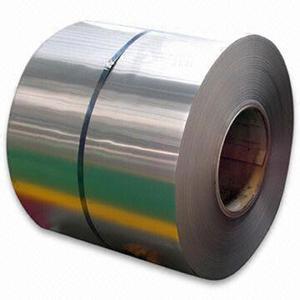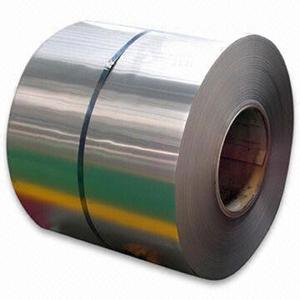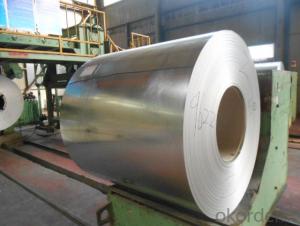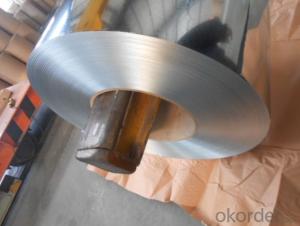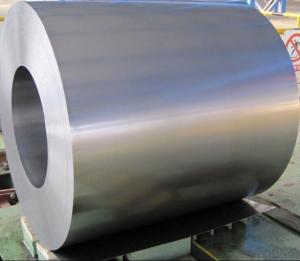Hot dipped Galvanized Steel Coil Zero Spangle
- Loading Port:
- China Main Port
- Payment Terms:
- TT or LC
- Min Order Qty:
- -
- Supply Capability:
- -
OKorder Service Pledge
Quality Product, Order Online Tracking, Timely Delivery
OKorder Financial Service
Credit Rating, Credit Services, Credit Purchasing
You Might Also Like
HOT DIP GALVANIZED STEEL COIL
Specification:0.4mm*1000mm*c
Steel Grade & Standard: ASTM A653
Zinc Coating Mass:Z180 Spangle:Zero Spangle
Surface Treatment: non-chromate, oiled
Coil ID:508mm Coil Weight:6-10MT
Package Type:EYE TO SIDE
Thickness Tolerance:+/-0.02mm Width Tolerance:+/-5mm
Zinc Coating Tolerance:-/+10g/m2
- Q: i need some ideas of what material could replace iron or steel to make fridges, stoves, dishwashers, tractors, aircrafts, cars and buses and anything else that is made of iron and steel. anything is greatly appreciated as at the moment i have no idea what to put down.
- Material selection is a complex area. Iron and steel are very good materials in terms of their strength, stiffness and hardness (especially when compared to their density to give specific strength/stiffness. They are also relatively cheap and the economics of material selection is often the over-riding criteria. Each individual substitution has to be considered on the merits of what the component has to do and the environment in which it operates and often to replace steel with, say, aluminium, might not be appropriate or might require a redesign of the component to accomodate the lower strength and stiffness. Take one of your examples of a dishwasher; To replace the (cheap and thin) steel outer casing with aluminium would require thicker sheet to achieve the same stiffness. To replace the stainless steel inner you would need a corrosion resistant material (which rules out aluminium) which can be easily fabricated to shape. Nickel alloys would be harder to process and very expensive, but you might be able to use a bronze alloy. If you have time look in the library for a book on materials selection by Ashby - one of the best texts on the subject.
- Q: How are steel coils used in the manufacturing of structural components?
- Steel coils are used in the manufacturing of structural components by being processed through various techniques such as cutting, bending, and welding to form the desired shapes and sizes. These coils serve as the raw material for fabricating beams, columns, and other structural elements used in buildings, bridges, and infrastructure projects. The high strength and durability of steel make it an ideal choice for constructing load-bearing components, ensuring the stability and integrity of the structures.
- Q: What are the common applications of pre-painted galvanized steel coils?
- Pre-painted galvanized steel coils have a wide range of applications across various industries. Some of the common applications include: 1. Construction: Pre-painted galvanized steel coils are extensively used in the construction industry for roofing, wall cladding, and structural components. The coating on these coils provides excellent corrosion resistance and durability, making them suitable for both residential and commercial buildings. 2. Automotive: These coils are also widely used in the automotive industry for manufacturing parts and components such as body panels, interior trims, and underbody protection. The pre-painted coating enhances the aesthetic appeal of the vehicles while providing protection against rust and corrosion. 3. Appliances: Pre-painted galvanized steel coils are commonly used in the production of home appliances such as refrigerators, ovens, washing machines, and air conditioners. The smooth and durable coating on these coils ensures a long-lasting and visually appealing finish for the appliances. 4. Furniture: The pre-painted galvanized steel coils find application in the furniture industry for manufacturing cabinets, shelves, and other furniture components. The coating on these coils adds a decorative touch to the furniture while offering protection against scratches and wear. 5. Electrical and Electronics: These coils are utilized in the electrical and electronics industry for manufacturing switchboards, control panels, and enclosures. The pre-painted coating provides insulation and protection against electrical hazards, making them suitable for such applications. 6. Agricultural Equipment: Pre-painted galvanized steel coils are also used in the agricultural sector for manufacturing equipment like grain silos, livestock shelters, and poultry houses. The corrosion-resistant coating on these coils ensures the durability and longevity of the agricultural structures. 7. Signage and Advertisement: The vibrant and visually appealing colors of pre-painted galvanized steel coils make them a popular choice for signage and advertisement boards. The coated surface provides a smooth and glossy finish that enhances the visibility and attractiveness of the signage. In summary, the common applications of pre-painted galvanized steel coils include construction, automotive, appliances, furniture, electrical and electronics, agricultural equipment, and signage and advertisement. These coils offer excellent corrosion resistance, durability, and aesthetic appeal, making them suitable for a wide range of industries and applications.
- Q: How are steel coils inspected for thickness using ultrasonic testing?
- Steel coils can be inspected for thickness using ultrasonic testing, which is a non-destructive testing method. In this process, a handheld ultrasonic thickness gauge is used to measure the thickness of the steel coil. The ultrasonic thickness gauge emits high-frequency sound waves that travel through the steel coil. These sound waves bounce back from the backside of the coil, creating an echo. The time taken for the echo to return to the gauge is measured and used to calculate the thickness of the coil. The gauge consists of a transducer that emits the sound waves and a receiver that detects the echoes. The transducer is placed on the surface of the coil, and a coupling gel or oil is used to ensure a good acoustic contact between the transducer and the steel surface. The transducer emits a short burst of sound waves, which penetrates through the steel coil and reaches the backside. When the sound waves encounter any changes in the thickness of the coil, such as defects or variations, they get reflected back to the transducer. The receiver detects these echoes, and the time between the emission and reception of the sound waves is measured. Using the known speed of sound in steel, the time taken for the sound waves to travel through the coil and back can be converted into a thickness measurement. This provides an accurate assessment of the thickness of the steel coil at various points. Ultrasonic testing is a reliable and efficient method for inspecting the thickness of steel coils. It allows for quick measurements without damaging the material, making it suitable for quality control and ensuring compliance with manufacturing specifications.
- Q: Hi! does anyone know where can i find a building with a structure of steel frames, i need to do an analysis for school so i need joint details, girder details and such! PLEASE help me! thanks
- if u need to analyse a steel framed structure for joint details the best example would be of a mechanic workshop...the truss of such a workshop is always supported on a portal frame and in most of the case thats a steel structure...do keenly observe the joints at the footing plates that is connected to the girder section...nd also observe the joints in truss of such a frame....myslf m a civil engg. student.
- Q: Can steel coils be customized in terms of size and specifications?
- Certainly! Steel coils can indeed be personalized in terms of size and specifications. Although steel coils are normally produced in standard sizes and specifications, they can be customized to fulfill particular requirements based on the customer's preferences. Customization may involve altering the dimensions of the coils in terms of width, length, and thickness, as well as modifying specifications such as the type of steel, surface finish, and coating. Through this process, steel coils can be tailored to suit various applications and industries, ensuring that they meet the specific requirements and performance standards of customers. Industries such as automotive, construction, manufacturing, and appliances often utilize customized steel coils, as precise sizes and specifications are essential for efficient and effective operations.
- Q: They both sell the same thingIf prices are to high companies won't by the steelIf prices are to low then the steel company won't earn enoughWhy are some steel companies more successful than others
- Steel is a global commodity. There is some variety in product (flat rolled, tubing, etc), but basically the same product worldwide. Cost to the customer includes shipping of a very heavy product. Inputs are also heavy and costly to ship. Inputs: - Coal - Iron Ore. Some firms have the ability to recycle old steel, a competitive advantage. - Energy (very energy intensive industry) - Labor - Machinery. A new blast furnace is more efficient than 50 years old. So the most profitable steel firms have some of these characteristics: - Proximity to raw materials - Proximity to customers - Access to cheaper means of transportation; rail and sea - Newer machinery - Cheaper labor force - Reasonable cost for electricity and fuel for furnaces
- Q: How do steel coils contribute to strength and durability in manufacturing?
- Steel coils contribute to strength and durability in manufacturing in several ways. Firstly, steel is an inherently strong material due to its high tensile strength, which allows it to withstand heavy loads and resist deformation. When steel is coiled, it undergoes a process called hot rolling or cold rolling, which further enhances its strength and durability. During hot rolling, the steel is heated to high temperatures and then passed through a series of rollers, which compress and shape it into a coil. This process aligns the grain structure of the steel, making it more uniform and reducing internal stresses. The result is a stronger and more resilient material that can withstand the rigors of manufacturing processes such as bending, stamping, and forming without losing its structural integrity. Cold rolling, on the other hand, involves passing the steel through rollers at room temperature. This process not only increases the strength and hardness of the steel but also improves its surface finish. Cold-rolled steel coils are known for their smooth and uniform appearance, making them ideal for applications where aesthetics are important. Furthermore, steel coils can be coated with various protective layers to enhance their durability. These coatings, such as zinc or polymer-based coatings, act as barriers against corrosion, moisture, and other environmental factors that can weaken the steel. By preventing rust and degradation, these coatings extend the lifespan of steel coils and the products they are used in, making them more durable and cost-effective in the long run. In summary, steel coils contribute to strength and durability in manufacturing by providing a strong and resilient material that can withstand heavy loads and resist deformation. The hot rolling and cold rolling processes further enhance the strength and uniformity of the steel, while protective coatings help to prevent corrosion and extend the lifespan of the coils. Overall, steel coils are essential components in manufacturing that contribute to the strength and durability of a wide range of products.
- Q: What is the process of recycling steel coils?
- The process of recycling steel coils involves several steps to ensure the maximum utilization of the material and to minimize waste. Firstly, steel coils are collected from various sources, including industrial manufacturing facilities, construction sites, and scrap yards. These coils are then transported to a recycling facility where they undergo a thorough inspection to assess their quality and determine the appropriate recycling method. Next, the steel coils are cleaned to remove any contaminants such as dirt, oil, or paint. This is typically done using chemical agents or mechanical processes, depending on the level of contamination. Cleaning the coils is crucial as it ensures the quality of the recycled steel. After cleaning, the coils are shredded or sheared into smaller pieces to facilitate further processing. This step helps to increase the surface area, making it easier to separate the steel from other materials that might be present in the coils. Once the coils are broken down into smaller pieces, they go through a process known as magnetic separation. This involves passing the steel pieces through a magnetic separator that uses powerful magnets to attract and separate the ferrous steel from non-ferrous materials like aluminum or plastic. This separation is essential as it ensures the purity of the recycled steel. The separated steel pieces are then melted in a furnace at extremely high temperatures. This melting process not only removes any remaining impurities but also allows the steel to be molded into various shapes and forms, depending on the intended application. After melting, the molten steel is poured into molds or cast into ingots to solidify. These ingots can be further processed and transformed into new steel products or used as raw material in various industries. Throughout the recycling process, the steel coils are subjected to quality control measures to ensure that the resulting recycled steel meets the required specifications and standards. This includes conducting chemical analyses and mechanical tests to verify the strength, composition, and overall quality of the recycled steel. In conclusion, the process of recycling steel coils involves collecting, cleaning, shredding, separating, melting, and molding the steel to produce new products or raw material. This process not only helps to conserve valuable resources but also reduces the environmental impact associated with traditional steel production.
- Q: What are the weight ranges for steel coils?
- The weight ranges for steel coils can vary depending on the specific type and size, but they typically range from a few hundred kilograms to several metric tons.
Send your message to us
Hot dipped Galvanized Steel Coil Zero Spangle
- Loading Port:
- China Main Port
- Payment Terms:
- TT or LC
- Min Order Qty:
- -
- Supply Capability:
- -
OKorder Service Pledge
Quality Product, Order Online Tracking, Timely Delivery
OKorder Financial Service
Credit Rating, Credit Services, Credit Purchasing
Similar products
Hot products
Hot Searches
Related keywords
